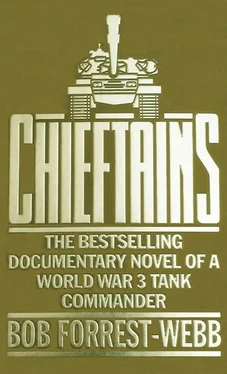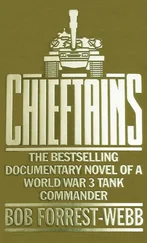Ginsborough’s head was above the deck. ‘The networks are all jammed. How did they jam HF? Oh God!’
‘Keep trying. We want a recovery vehicle.’ There was gunfire some distance away, but the immediate area was quiet, the silence adding tension to the situation. The landscape was so shell-sculpted it had an artificial lunar quality. Wisps of smoke drifted through the broken woods or hung in the craters. The air stank of diesel fumes, burning rubber and explosive… alien.
It was the same feeling Will Browning had experienced as a child, closing his eyes and counting to a hundred before searching for his friends; discovering they had run away in the woods and left him alone. The impression was strong now, undeniable.
He was trying to think, to reason. Losing radio contact was one thing, but losing your entire squadron another. When they had all entered the smoke and the artillery barrage, Idaho, Oregon and the lieutenant’s tank, Nevada, were all stationed to Utah’s right. And beyond the troop had been the remainder of the squadron; behind them, Browning assumed, the mechanized infantry support. He had listened to the shouted conversations, the orders and comments on the troop and squadron radio networks as they had advanced. He had heard them right through until… until when? Until the noise of battle grew too loud, the jamming had begun, when everything was confusing and demanding his total attention, and all sound had become white and unintelligible. Had he heard them only in his mind?
‘What the hell are we going to do?’ Podini yelled from the fighting compartment. Podini always sounded as through he were on the verge of panic, but never quite got there. Browning accepted it as a characteristic of Podini’s Latin background; the gunner made up for it in plenty of other ways.
‘You want to start walking back, alone? No? Then dry up!’ The smoke of the battlefield had thinned to the kind of watery mist that the master sergeant liked to associate with New England valleys on fall days, but this mist stank of war. In scattered places on the landscape fires burnt, spiralling dense and evil thunderheads in the warm afternoon air. Occasionally in the fires there would be small firecracker explosions, but the sounds of battle no longer surrounded them. The noises were still there, but for the time being they belonged to someone else.
Undulations in the ground made it difficult for Browning to see far beyond the first three hundred meters. He climbed back on to the tank and swung himself down into the turret. ‘Get your head out of the way Mike. Podini, bring the gun around.’ He switched the lenses to full magnifications as the electric motors began humming and the turret moved. ‘Slow, I want a real easy scan.’ The lenses were concentrating the smoke mist and exaggerating the mirage effect of the sun’s heat on the damp ground. The landscape was hazy, shimmering. ‘Stop… hold it.’
There was wreckage.
‘Russian T-60,’ said Podini, dryly. He moved the turret a couple of degrees to bring the wrecked vehicle to the centre of the lens, then checked the range with the laser. ‘Two thousand six hundred meters.’
‘Okay, go on some more.’
The turret revolved slowly, then stopped. ‘XM1… an Abrams.’ There had been no change in the tone of Podini’s voice; it was flat, mechanical. ‘Two thousand nine hundred meters.’
‘Confirmed.’ The hull of the squadron’s Abrams was torn open at the side, exposing the still-smoking fighting compartment.
‘It’s Idaho.’ There was more emotion with Podini’s recognition of the vehicle.
‘How the hell can you know that?’
‘It’s Idaho… Acklin’s wagon… you think I’m dumb?’ Podini’s voice level was rising.
‘Okay, okay. Take it round again.’
In the next two minutes they identified nine more of the squadron’s XM1s. There were other wrecks, too far away for either of them to be certain they belonged to friends or enemy. And no living thing moved on the battleground.
‘He always has to be first,’ Podini complained loudly and bitterly. ‘Adams has to be first every time. Adams, why the hell you want to be first, always up-front? Why aren’t you last sometime, like ordinary people?’
‘Fuck off, Pino. I only drive to order.’
Browning knew that the squadron’s counterattack had failed, destroyed by the power of the Russian barrage from across the river in East German territory, and from Soviet positions ahead of the US armour. What little smoke there had been was no protection against the BM21 rockets fired from behind the border where they had obviously been deployed in battalion groups capable of landing more than seven hundred missiles on a square kilometer of ground in twenty seconds. Coupled with conventional artillery fire, it had blanketed the area occupied by the XM1s and their support. Shell and rocket craters were so close together in places on the battlefield that they overlapped. Sometime, while Browning’s XM1 had been grinding its way through the inferno, jinking the shell explosions with its crew deafened by the howls and shrieks of the missiles, the radio useless with interference and jamming, there must have been an order for the survivors to withdraw. He hadn’t heard it.
‘I guess we’re up to our eyeballs in shit,’ commented Hal Ginsborough.
Adams called up from the driving position, ‘Well, at least we ain’t dead!’
‘But you tried, man, you sure tried,’ taunted Podini.
The Podini versus Adams duelling didn’t bother Browning; it was part of the two men’s friendship. It worried outsiders who didn’t understand that it was an essential feature of their communication process. Only a few days previously, Adams had rescued Podini from a bar fight that developed when a black artillery corporal had tried, uninvited, to defend Adams’ dignity.
‘I’m going outside to have a look around,’ Browning told his crew. It seemed to him Utah was situated in the calm eye of a tornado, and at any minute it would be swirled back into the violence. The peace was surely artificial. There should be Soviet patrols pacifying the area, their battlefield police taking charge of prisoners, engineers recovering tanks and vehicles for’ the workshops. He could only think the Soviet bridgehead had been far stronger than the intelligence information had led Divisional Command to believe, and that when the main thrust of Soviet armour across the river had remained undeflected by the abortive counterattack to its flank, then it had continued to follow their commander’s original orders and attack route. Soviet tactics tended to be inflexible. He tried to guess at their objective; the city of Fulda and the multiple highway linkage were almost due west, and possibly their first Red. ‘Mike, Hal, both of you stay inside here. Keep out of sight. Pino, get your sidearm and come with me.’
Browning didn’t enjoy being outside his tank in combat zones. There was security in thick steel, even if the infantry referred to tanks as ‘Ronsons’ and swore they would rather fight as smaller and less inflammable targets out in the open. Now, as he began climbing the hill through the stumps of the torn woodland, he felt vulnerable and defenceless; the Remington automatic pistols which he and Podini came. were poor substitutes for Utah’s powerful weapons.
Much of the low hill had been scalped by artillery fire, but there was some protection close beneath the limestone outcrops. Near the top he paused and looked back across the battlefield. The ridge of forested hills which had been the squadron’s earlier position were eight kilometers to the south and were still hidden by smoke drifting above the ruins of Gunthers. It seemed impossible Utah could have survived the barrage which had destroyed many tanks. He counted thirty wrecked vehicles, and realized there would be more south of the village. It was no longer simply a question of repairing the XM1 to get her back to the regiment, but a matter of survival for the crew and himself… he couldn’t see how they would make it.
Читать дальше












